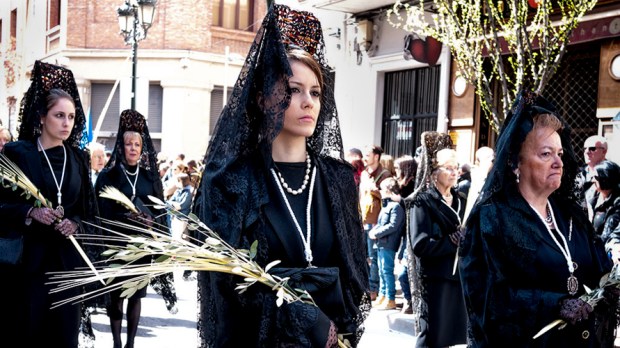Lenten Campaign 2025
This content is free of charge, as are all our articles.
Support us with a donation that is tax-deductible and enable us to continue to reach millions of readers.
Is Holy Week really worth the effort? If you talk to pastors, liturgists, choir directors, leaders of RCIA, etc., Holy Week is a time of frenetic activity, the culmination of much planning and lack of planning, and somehow—at least sometimes—inspiring. And then…? Well, a few weeks of lilies and extra “Alleluias!” and then back to business as usual. (E.g., First Confessions and Communions in May, a spate of weddings in June, etc.) It seems that Holy Week is a lot of work for a few, an inconvenience for a few more (“How many times do I have to drag the kids to church this week?!?”), and an annual irrelevance for many, if not most Catholics. But does it have to be that way?
Here’s the key problem with Holy Week as described above: People who halfheartedly believe that they’re sinners try to stir up sorrow for an atoning death they’re not quite convinced they need, so that a few days later they can try to stir up joy for the benefits of a resurrection they don’t quite understand or believe in. So understood, it’s not very convincing theater, and even less is it worthy worship.
Why do we put up with it? Why does the Church ask us to put on this act year after year? That’s asking the wrong question. Better: What is divine mercy and providence offering us in Holy Week? And how can we be good stewards of what could be the last Holy Week we will ever see? (Remember that not one future moment is guaranteed to anyone.)
We’re created in the image and likeness of God. Our souls, which we surrendered to the dominion of Satan by our sin, are worth fighting for. Jesus, Son of God and son of Mary, ransomed our souls with his own blood. If you were given one week before your death to contemplate that truly shocking fact—how would you spend it?
The human heart was created for love of God and neighbor. By sin, we betray love and withdraw into a most unnatural isolation yielding only rage and bitter loathing. The innocent heart of Jesus freely absorbed all that poison of betrayal and hatred, so that our hearts could be free to love as he loves, in a truly human way that is ennobled by his divinity. If you were given one week before your death to contemplate that truly shocking fact—how would you spend it?
The human body was created for beauty, service, life-giving and for glory. Defiling the human body through abuse, neglect, violence, promiscuity or perversion constitutes desecration. Jesus, the Word-made-flesh, agreed to be tortured to death. He did so to prove God’s stubborn love for the human body, and to enable God’s children to behold God face-to-face, and live. If you were given one week before your death to contemplate that truly shocking fact—how would you spend it?
Before his agony and death, Jesus knows that the divine plan is to reach every human person, from Jerusalem to the ends of the earth to the end of time, and offer one sure path, one way to enter the narrow gate into the happiness of Heaven. He entrusts his saving power, word and mysteries to the Church built upon the foundation of the Apostles—whose chief mission is to offer the Eucharistic sacrifice until the Lord returns in glory. If you were given one week before your death to contemplate that truly shocking fact—how would you spend it?
If you were given one last Holy Week to cast aside once and for all whatever was unworthy of your Christian identity, what would you do? If you were given one last Holy Week to fling yourself at the feet of Jesus and cling to him for your salvation, what would you do? If you were given one last Holy Week to show compassion and gratitude to Jesus for the gruesome suffering he endured for you, what would you do? If you were given one last Holy Week to prove your stewardship and gratitude for the glories Christ has won for you, what would you do?
Please, let’s agree that this week, we may prepare wisely for what may well be, as far as we know, the last Holy Week we’ll ever see. Let’s go beyond noting the times of the Holy Week services and instead prepare to live the Holy Week mysteries. We can do that by immersing ourselves in the Scriptures, in the best of Catholic art and music, and through penances and fasting, so that we might hold fast to Jesus as he undergoes our darkness and offers us his light.
When I write next, I will speak of Easter, Heaven, and happy reunions. Until then, let’s keep each other in prayer.
[Listen to Fr. McTeigue discuss this piece with John Harper on Relevant Radio – Ed]

